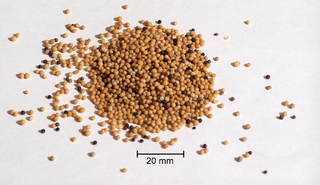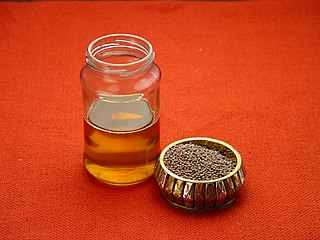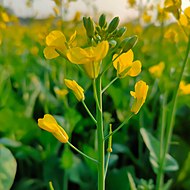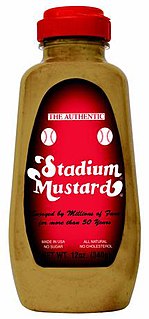
Mustard gas, though technically not a gas and often called sulfur mustard by scholarly sources, is the prototypical substance of the sulfur-based family of cytotoxic and vesicant chemical warfare agents, which can form large blisters on exposed skin and in the lungs. It has a history of use as a blister-agent in warfare and, along with organoarsenic compounds such as Lewisite, is the most well-studied of such agents. Related chemical compounds with similar chemical structure and similar properties form a class of compounds known collectively as sulfur mustards or mustard agents. Pure sulfur mustards are colorless, viscous liquids at room temperature. When used in impure form, such as warfare agents, they are usually yellow-brown and have an odor resembling mustard plants, garlic, or horseradish, hence the name. The common name of "mustard gas" is inaccurate because the sulfur mustard is not actually vaporized, but dispersed as a fine mist of liquid droplets. Mustard gas was originally assigned the name LOST, after the scientists Wilhelm Lommel and Wilhelm Steinkopf, who developed a method of large-scale production for the Imperial German Army in 1916.

Brassica is a genus of plants in the cabbage and mustard family (Brassicaceae). The members of the genus are informally known as cruciferous vegetables, cabbages, or mustard plants. Crops from this genus are sometimes called cole crops—derived from the Latin caulis, denoting the stem or stalk of a plant.

Mustard seeds are the small round seeds of various mustard plants. The seeds are usually about 1 to 2 millimetres in diameter and may be colored from yellowish white to black. They are an important spice in many regional foods and may come from one of three different plants: black mustard, brown Indian mustard, or white/yellow mustard.

Liverwurst, leberwurst, or liver sausage is a kind of sausage made from liver. It is eaten in many parts of Europe, including Austria, Bulgaria, Croatia, the Czech Republic, Denmark, Finland, Germany, Hungary, Latvia, the Netherlands, Norway, Poland, Romania, Russia, Serbia, Slovakia, Slovenia, Sweden, Ukraine, United Kingdom; it is also found in North and South America, notably in Argentina and Chile.

The term mustard oil is used for two different oils that are made from mustard seeds:

Colman's is an English manufacturer of mustard and other sauces, formally based and produced for 160 years at Carrow, in Norwich, Norfolk. Owned by Unilever since 1995, Colman's is one of the oldest existing food brands, famous for a limited range of products, almost all varieties of mustard. In 2019 the Colman’s factory in Norwich rolled its last jar of mustard off the production line and its Use By Date was changed for the occasion to: "Norwich's Last. By Its Finest. July 24th 2019". Colman’s continued making other condiments at the Carrow site until closing its doors in early 2020.

Brassica nigra, or black mustard, is an annual plant cultivated for its black or dark brown seeds, which are commonly used as a spice. It is native to tropical regions of North Africa, temperate regions of Europe, and parts of Asia.

The mustard plant is a plant species in the genera Brassica and Sinapis in the family Brassicaceae. Mustard seed is used as a spice. Grinding and mixing the seeds with water, vinegar, or other liquids creates the yellow condiment known as prepared mustard. The seeds can also be pressed to make mustard oil, and the edible leaves can be eaten as mustard greens.

Brassica juncea, commonly brown mustard, Chinese mustard, Indian mustard, leaf mustard, Oriental mustard and vegetable mustard, is a species of mustard plant.

Nitrogen mustards are cytotoxic organic compounds with the chloroethylamine (Cl(CH2)2NR2) functional group. Although originally produced as chemical warfare agents, they were the first chemotherapeutic agents for treatment of cancer. Nitrogen mustards are nonspecific DNA alkylating agents.

White mustard is an annual plant of the family Brassicaceae. It is sometimes also referred to as Brassica alba or B. hirta. Grown for its seeds, used to make the condiment mustard, as fodder crop, or as a green manure, it is now widespread worldwide, although it probably originated in the Mediterranean region.

Grey Poupon is a brand of whole-grain mustard and Dijon mustard which originated in Dijon, France.

Gulden's is the third largest American manufacturer of mustard, after French's and Grey Poupon. The oldest continuously operating mustard brand in the United States, it is now owned by agricultural giant ConAgra Foods.

Stadium Authentic Mustard is the trademarked name of a brown mustard, manufactured in Illinois, popular in Northeast Ohio, particularly in Cleveland. Stadium Authentic is an alternative formulation of Joe Bertman's original signature mustard recipe, also produced by Bertman's family's company as Bertman Original Ballpark Mustard. Stadium Authentic Mustard is sold at retail outlets and served in over 150 stadiums and arenas throughout the United States.

Mustard is a condiment made from the seeds of a mustard plant.

Dijon Isaiah McFarlane, known professionally as Mustard, is an American record producer, DJ, record executive, rapper, and songwriter. He is a frequent collaborator of fellow California-bred artists YG and Ty Dolla Sign; among various other records for the hip hop and R&B genres since his entrance into mainstream music with Tyga's 2011 single, "Rack City".

Dijon mustard is a traditional mustard of France, named after the town of Dijon in Burgundy, France, which was the center of mustard making in the late Middle Ages and was granted exclusive rights in France in the 17th century. First used in 1336 for the table of King Philip VI, it became popular in 1856, when Jean Naigeon of Dijon replaced the usual ingredient of vinegar in the recipe with verjuice, the acidic juice of unripe grapes.
















